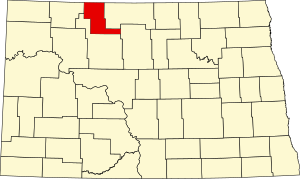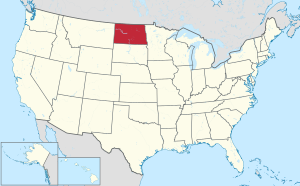Renville County, North Dakota
Renville County | |
|---|---|
 Location within the U.S. state of North Dakota | |
 North Dakota's location within the U.S. | |
| Coordinates: 48°43′N 101°40′W / 48.71°N 101.66°W | |
| Country | |
| State | |
| Founded | June 3, 1910 |
| Named for | Joseph Renville |
| Seat | Mohall |
| Largest city | Mohall |
| Area | |
| • Total | 893 sq mi (2,310 km2) |
| • Land | 877 sq mi (2,270 km2) |
| • Water | 16 sq mi (40 km2) 1.8% |
| Population | |
| • Estimate (2015) | 2,571 |
| • Density | 2.8/sq mi (1.1/km2) |
| Time zone | UTC−6 (Central) |
| • Summer (DST) | UTC−5 (CDT) |
| Congressional district | At-large |
| Website | www |
Renville County is a county located in the U.S. state of North Dakota. As of the 2010 census, the population was 2,470.[1] Its county seat is Mohall.[2] The county was originally created in 1873 but not organized until 1910.[3][4]
Renville County is part of the Minot, ND Micropolitan Statistical Area. It is located south of the Canada–United States border with Saskatchewan.
History
The first Renville County was created by the 1872-73 Dakota Territory legislature, but was dissolved because of too little settlement. The name was then brought back in the 1908 general election under a proposal to divide Ward County. Though defeated on election day, the matter went to court, which led to the creation of the present-day Renville County in 1910. The county government was first organized on July 23, 1910; Mohall has always been the county seat.[3] The county's name honors Joseph Renville, an interpreter, translator, and important figure in dealings between white men and the Sioux.
Geography
According to the U.S. Census Bureau, the county has a total area of 893 square miles (2,310 km2), of which 877 square miles (2,270 km2) is land and 16 square miles (41 km2) (1.8%) is water.[5]
Major highways
Adjacent counties and rural municipalities
- Mount Pleasant No. 2, Saskatchewan (north)
- Argyle No. 1, Saskatchewan (north)
- Bottineau County (east)
- McHenry County (southeast)
- Ward County (south)
- Burke County (northwest)
National protected area
Demographics
| Census | Pop. | Note | %± |
|---|---|---|---|
| 1910 | 7,840 | — | |
| 1920 | 7,776 | −0.8% | |
| 1930 | 7,263 | −6.6% | |
| 1940 | 5,533 | −23.8% | |
| 1950 | 5,405 | −2.3% | |
| 1960 | 4,698 | −13.1% | |
| 1970 | 3,828 | −18.5% | |
| 1980 | 3,608 | −5.7% | |
| 1990 | 3,160 | −12.4% | |
| 2000 | 2,610 | −17.4% | |
| 2010 | 2,470 | −5.4% | |
| 2015 (est.) | 2,571 | [6] | 4.1% |
| U.S. Decennial Census[7] 1790-1960[8] 1900-1990[9] 1990-2000[10] 2010-2015[1] | |||
2000 census
As of the census of 2000, there were 2,610 people, 1,085 households, and 748 families residing in the county. The population density was 3 people per square mile (1/km²). There were 1,413 housing units at an average density of 2 per square mile (1/km²). The racial makeup of the county was 97.74% White, 0.23% Black or African American, 0.65% Native American, 0.46% Asian, 0.11% from other races, and 0.80% from two or more races. 0.73% of the population were Hispanic or Latino of any race. 41.8% were of Norwegian, 25.7% German and 5.6% Irish ancestry.
There were 1,085 households out of which 28.70% had children under the age of 18 living with them, 60.40% were married couples living together, 5.60% had a female householder with no husband present, and 31.00% were non-families. 28.50% of all households were made up of individuals and 14.70% had someone living alone who was 65 years of age or older. The average household size was 2.35 and the average family size was 2.90.
In the county the population was spread out with 23.30% under the age of 18, 4.90% from 18 to 24, 24.40% from 25 to 44, 25.30% from 45 to 64, and 22.00% who were 65 years of age or older. The median age was 44 years. For every 100 females there were 100.30 males. For every 100 females age 18 and over, there were 101.70 males.
The median income for a household in the county was $30,746, and the median income for a family was $36,023. Males had a median income of $25,346 versus $16,700 for females. The per capita income for the county was $16,478. About 8.50% of families and 11.00% of the population were below the poverty line, including 14.10% of those under age 18 and 9.10% of those age 65 or over.
2010 census
As of the 2010 United States Census, there were 2,470 people, 1,061 households, and 685 families residing in the county.[11] The population density was 2.8 inhabitants per square mile (1.1/km2). There were 1,386 housing units at an average density of 1.6 per square mile (0.62/km2).[12] The racial makeup of the county was 97.9% white, 0.4% American Indian, 0.2% Asian, 0.1% black or African American, 0.2% from other races, and 1.2% from two or more races. Those of Hispanic or Latino origin made up 1.0% of the population.[11] In terms of ancestry, 39.5% were German, 39.1% were Norwegian, 11.6% were Irish, 9.7% were English, 9.5% were Swedish, and 2.3% were American.[13]
Of the 1,061 households, 25.8% had children under the age of 18 living with them, 56.7% were married couples living together, 5.1% had a female householder with no husband present, 35.4% were non-families, and 30.9% of all households were made up of individuals. The average household size was 2.28 and the average family size was 2.85. The median age was 45.4 years.[11]
The median income for a household in the county was $49,583 and the median income for a family was $63,068. Males had a median income of $39,950 versus $25,469 for females. The per capita income for the county was $26,856. About 3.8% of families and 5.9% of the population were below the poverty line, including 5.9% of those under age 18 and 9.6% of those age 65 or over.[14]
Communities
Cities
Townships
- Brandon
- Callahan
- Clay
- Colquhoun
- Eden Valley
- Ensign
- Fairbanks
- Grassland
- Grover
- Hamerly
- Hamlet
- Hurley
- Ivanhoe
- Lockwood
- McKinney
- Muskego
- Plain
- Prescott
- Prosperity
- Rockford
- Roosevelt
- Stafford
- Van Buren
- White Ash
Unincorporated communities
See also
References
- ^ a b "State & County QuickFacts". United States Census Bureau. Retrieved November 1, 2013.
- ^ "Find a County". National Association of Counties. Retrieved 2011-06-07.
- ^ a b "County History". Official Portal for North Dakota State Government. Retrieved 4 May 2011.
- ^ "Dakota Territory, South Dakota, and North Dakota: Individual County Chronologies". Dakota Territory Atlas of Historical County Boundaries. The Newberry Library. 2006. Retrieved February 4, 2015.
- ^ "2010 Census Gazetteer Files". United States Census Bureau. August 22, 2012. Retrieved February 1, 2015.
- ^ "County Totals Dataset: Population, Population Change and Estimated Components of Population Change: April 1, 2010 to July 1, 2015". Retrieved July 2, 2016.
- ^ "U.S. Decennial Census". United States Census Bureau. Retrieved February 1, 2015.
- ^ "Historical Census Browser". University of Virginia Library. Retrieved February 1, 2015.
- ^ Forstall, Richard L., ed. (April 20, 1995). "Population of Counties by Decennial Census: 1900 to 1990". United States Census Bureau. Retrieved February 1, 2015.
- ^ "Census 2000 PHC-T-4. Ranking Tables for Counties: 1990 and 2000" (PDF). United States Census Bureau. April 2, 2001. Retrieved February 1, 2015.
- ^ a b c "DP-1 Profile of General Population and Housing Characteristics: 2010 Demographic Profile Data". United States Census Bureau. Retrieved 2016-04-03.
- ^ "Population, Housing Units, Area, and Density: 2010 - County". United States Census Bureau. Retrieved 2016-04-03.
- ^ "DP02 SELECTED SOCIAL CHARACTERISTICS IN THE UNITED STATES – 2006-2010 American Community Survey 5-Year Estimates". United States Census Bureau. Retrieved 2016-04-03.
- ^ "DP03 SELECTED ECONOMIC CHARACTERISTICS – 2006-2010 American Community Survey 5-Year Estimates". United States Census Bureau. Retrieved 2016-04-03.
- ^ Greene, shown on a 1977 USGS map (at present day 46th Ave NW and 86th Street NW), was a former station stop on the Minneapolis, St. Paul and Sault Saint Marie Railroad. Its former streets are still shown on Google Earth and Yahoo! Maps
- ^ [1], Greene, ND. Retrieved January 2, 2011.


